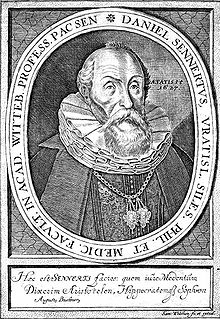Daniel Sennert
| Daniel Sennert | |
|---|---|
 |
|
| Doctoral advisor | Jan Jesenius |
| Doctoral students | Werner Rolfinck |
Daniel Sennert (November 25, 1572 – July 21, 1637) was a renowned German physician and a prolific academic writer, especially in the field of alchemy or chemistry. He held the position of professor of medicine at the University of Wittenberg for many years.
Daniel Sennert was born in 1572 in the city of Breslau (now Wrocław), at the time part of the Habsburg Monarchy. His father, Nicolaus Sennert, was a shoemaker from Laehn, Silesia.
Sennert attended the University of Wittenberg and received his master's degree in 1598 and his medical degree in 1601. In his early work, he demonstrated an avoidance of alchemical theory and an acceptance of Aristotelian theory. However, within a decade of receiving his medical degree he had changed to accepting alchemical transmutation and experimentation as valid. He published a number of popular books on alchemy and chemistry, several of which received a number of reprintings and translations. He served on the faculty at the University of Wittenberg for the rest of his life, serving six times as the Dean of the medical faculty at Wittenberg, and also served as the physician to many aristocrats and rulers, including John George I, Elector of Saxony. He died of the plague in 1637 in Wittenberg.
Sennert is notable for his contributions to the development of an early version of atomic theory. Specifically, he forms an intermediate bridge between the works of Geber and the more recognized Corpuscularianists such as Robert Boyle. Corpuscularianism differs from modern atomic theory in a number of significant ways, most noticeably a lack of a mathematical argument for its existence, something Sennert specifically rejected. Sennert is an intermediate step between corpsucular particle theory and Aristotelian forms. The same works that are often sited as demonstrating his early atomist views also emphasize the importance of substantial forms. Sennert's theories were based on an experiential and experimental evidence that he gathered both from eyewitness accounts and his own laboratory experience.
...
Wikipedia
